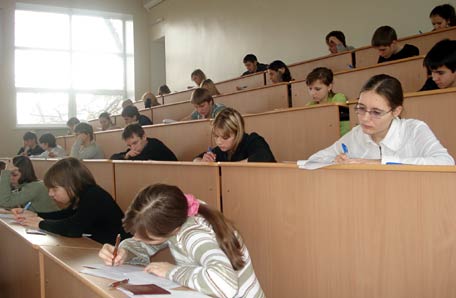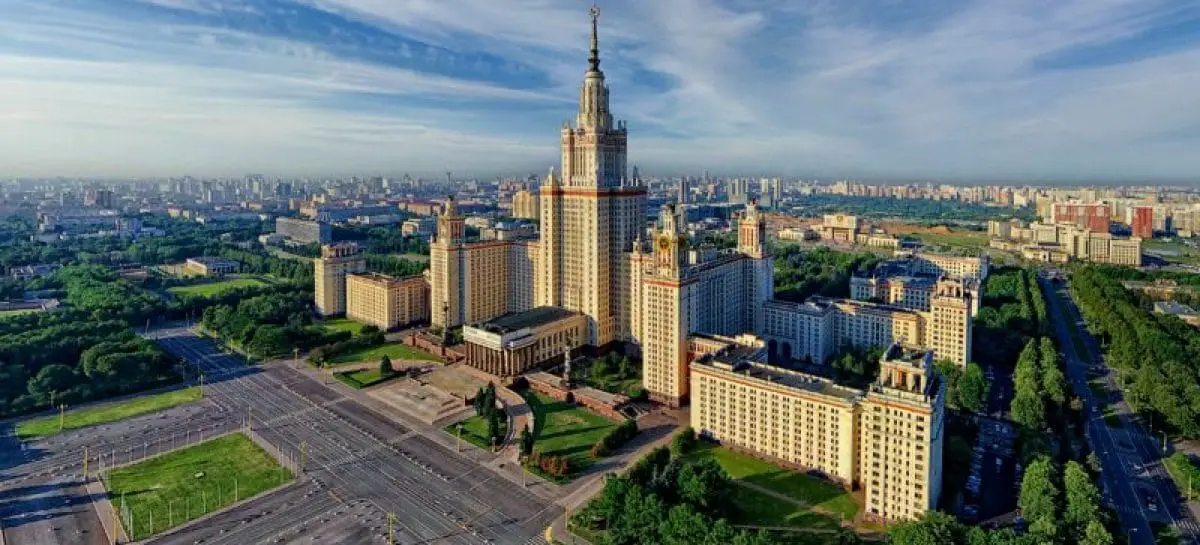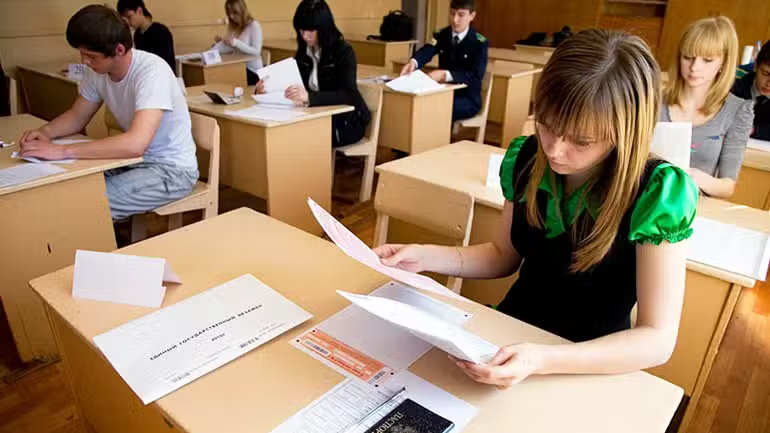Moscow State University (MSU) is one of the top-ranked universities in Russia, and admission is highly competitive. To be considered for admission to MSU, students must first pass the Unified State Exam (USE), which is essentially Russia’s SATs, but then also pass MSU’s specific entrance exams, which are subject-specific exams in the field of study the student wishes to pursue.
Olga Dmitraschenko entered Moscow State University in 2006, after completing her high school experience via home schooling. She wrote of her experience taking MSU’s entrance exams in the text that follows as part of a series of free Russian lessons sponsored by SRAS called Olga’s Blog, which documents – in simplified, modern Russian – her experience finishing high school, starting college, and living life in Moscow in 2006. The text, links, and format of this resource were last updated in 2023.
Briefly About Moscow State’s University Entrance Exams
The entrance exams for Moscow State University are typically administered in June and consist of both written and oral components.
The specific exams required for each program vary, but they generally cover a wide range of topics related to the field of study. For example, students applying to the Faculty of Physics may be required to take exams in general physics, mathematical methods in physics, and theoretical mechanics, among others.
The exams are highly competitive, and the difficulty level varies depending on the program. Students are typically required to score well above the minimum passing score to be considered for admission, and the number of available spots for each program is limited. Thus, it is possible to score well but still not make the cut because others taking the exam scored slightly better than you did.
There are two tracks to get into the program. One is through the regular entrance exams, which can earn the student a slot in the program fully funded by the federal government. These slots are refereed to as “budget” because they are funded by the federal budget.
Another track is through an “Olympiad,” another highly competitive set of exams that can earn the student one of a limited of “non-budget” exams. Although difficult to secure, tuition for paid slots is fairly low by American standards, average about $3000-7000 per academic year in 2021.
In the text below, Olga participates in the Olympiad as a way to prepare for the regular entrance exams.
Moscow State’s University Entrance Exams: Simplified Russian Text from Olga’s Blog
This is Lesson 4 of Olga’s Blog, a series of free intermediate Russian lessons.
Note that:
- All of the bold words and phrases have annotation below.
- Red words and phrases indicate the subject of this blog entry’s grammar lesson.
- *Asterisks indicate slang.
Привет!
Сегодня вы узнаете все самое интересное про вступительные экзамены в МГУ! Опишу все подробно, поэтому, мой рассказ будет длиннее, чем обычно, и в двух частях.
Итак, пожалуй, начнем с подготовки к экзаменам: С сентября 2005 (две тысячи пятого) года я ходила на курсы факультета Мировой политики, в МГУ. Там изучались три предмета, которые нужно сдавать при поступлении – литература, английский язык и история России. Всего на курсах было три группы, по пятнадцать человек в каждой.
Занятия проходили три раза в неделю по вечерам и длились по три часа. Учителя у нас были строгие и требовательные, много задавали домашних заданий, много спрашивали на уроках. В апреле курсы закончились, потому что скоро должна была состояться олимпиада.
Олимпиада – почти то же самое, что и летние вступительные экзамены. Только она проводится лишь на платные места. Кто хочет поступать на бюджет должен сдавать экзамены летом. А я решила использовать олимпиаду как тренировку перед экзаменами. В начале апреля я пришла в деканат вместе со всеми остальными поступающими, а их было около восьмисот человек. Простояв длинную очередь, я сдала необходимые документы для поступления:
-
Паспорт
-
Копия паспорта
-
Черно-белые матовые фотографии 3×4 (шесть штук)
-
Справка из школы о том, что я являюсь ученицей одиннадцатого класса (это был апрель месяц и аттестатов у нас еще не было)

Мне сразу выдали пропуск на экзамен (поступать на экзамен в МГУ может любой ученик, сдавший заранее документы), справку абитуриента и экзаменационный лист, в который в дальнейшем мне ставили оценки за каждый экзамен.
Через пару дней начиналась олимпиада, и меня охватил стрем.* Но не меня одну – боялись все. Первым экзаменом была литература – сочинение. Нас рассадили в большие аудитории, раздали бумагу и сказали темы сочинений. Их было три:
- Первая – «Медный всадник» Пушкина как петербургская повесть
- Вторая – Исторические деятели в романе Толстого «Война и мир»
- Третья – Трагическое в произведении Горького «На дне»
Я выбрала первую тему. Она показалась мне самой интересной, да и на курсах мы разбирали это произведение. На экзамен нам отвели четыре часа времени. Этого было вполне достаточно. Но все ребята так нервничали, что время летело незаметно. Через два дня после экзамена нам сообщили результаты. Больше половины учеников получили двойки! И на следующее испытание прошло около трехсот человек. Я была счастлива, что получила четыре, потому что четверок было всего около десяти. А пятерки ни одной.
Vocabulary and Cultural Annotations
Подготовка к экзаменам: Preparations for exams. This was taken as part of Olga’s eksternat education – at the same time as completing her 10th and 11th grade education.
Мировая политика: World Politics. This relatively new faculty at MGU is meant to “prepare specialists and analysts who will represent Russia’s interests” in international corporations and organizations, foreign governments, and intergovernmental structures. The curriculum entails everything from higher mathematics and economics to “culturology” and history.
Сдавать/сдать при поступлении: To take before entering. “Сдавать” literally means “to give” or “to yield” and is most often used in reference to taking tests. Notice as well that students are required to know English even before being admitted to the university program.
Олимпиада: Olympiad. The Olympiad is prestigious event held as regional events annually throughout Russia. Students are nominated by their teachers and selected by their schools to represent the institution in a sort of academic decathlon. There is even a national Olympiad which is televised. In the case of the Moscow Olympiad held at MGU, those with the highest scores “win” places at MGU, but must pay for their education. Those hoping to enter the university on full-ride scholarships (to attend “на бюджет”) must complete the formal entrance exams. In Russia, the state sets aside a certain number of university places which are given for free to top students.
Лишь: Just (only). “Лишь” is a commonly used and hard-to-translate Russian word. It can mean “only,” “just,” “merely,” “but,” or “as soon as.” The phrase “Только она проводится лишь на платные места” can thus be fairly translated as “Only it is given for just paid (university) places.” However, consider other usages: “лишь вошел, собака залаяла” — “no sooner had he entered than the dog began to bark” or “лишь бы он мог приехать…” — “provided that he can come…”
Черно-белые матовые фотографии: Matte-finish black-and-white photographs. An amazing number of things in Russia require passport-size photographs – applying to university, registering in your apartment (which all Russians and foreigners must do), applying for many jobs, even getting a library card requires at least two pictures! Фото на документы – (Photograph for documents) is a service widely offered and advertised in Russian cities.
3×4: Pronounced “три на четыре.” 3×4 centimeters is the standard photograph size for “document photos” in Russia. Incidentally, the equation “3 x 4” can be said the same the same way: “три на четыре равно двенадцать” – “three times four equals twelve.”
Абитуриента: Applicant. The word “абитуриента” is very flexible however, and can actually mean “graduate,” “final-year student,” “applicant,” or “entrant.”
Экзаменационный лист: “Examination list.” This has no equivalent in America. The list doubles as both a pass to get into the exam (it generally includes a photograph of the student as ID!) and acts as a grade sheet to record the student’s score. The teacher keeps his/her own grade book as well, however.
В дальнейшем: In the future; later.
Стрем:* Slang word for “fear.” It is derived from the verb “стремиться” which can mean “to aspire,” “to be anxious,” or “to rush.” Standard words for fear include “страх” and “боязнь.” Notice as well the verb associated with fear here: охватить/охватывать (to seize or envelop); e.g. “меня охватил страх” – “Fear enveloped me.”
Повесть: Narrative or story. From the verb поводить/повести, to move, guide, or lead.
Трагическое в произведении Горького «На дне»: The tragic in Gorky’s work The Lower Depths. Notice that, like discussed in the second installment of “Olga’s Blog,” “трагическое” is an adjective used without a referent and in the neuter. It thus refers to everything as a group that can be described with that adjective. Hence, “the tragic” is the most precise English translation to “трагическое.” However, notice that sometimes more liberal translations are needed. The title of Gorky’s book «На дне» most closely translates as the almost comical “On the Bottom.”
Разбирать/разобрать: To investigate or discuss. the word also carries a myriad of other meanings including: to strip, disassemble, understand, decipher, take, purchase, or hear (a legal case). It is often used when discussing intellectual studies or endeavors.
Grammar Focus: Present Passive Participles
This is Lesson 4 of Olga’s Blog, a series of free intermediate Russian lessons. This is also the fourth installment dealing with participles in Russian. Previous editions have given instruction on present active participles, participles without referents, and past active participles.
Verbs in Russian, like those in English, have forms that may be used as adjectives. These forms, known as participles, are often used as a simple way to provide variety and flexibility to sentence structures.
Present passive participles take the object of a transitive verb and make it the subject. Because the passive voice is can be constructed differently in English and Russian, and because English often avoids the passive while Russian often embraces it, translation of these participles can be difficult.
In English, participles themselves do not have a distinctly passive form, but can be formed into passive participle clauses in the present progressive by joining the present participle form of the verb “to be” with the past participle form of another verb. “The book being read by the girl belongs to my brother” is an example of just such a construction. The referent of the participle clause is actually the subject of this sentence, unlike in the examples in previous installments of Olga’s Blog.
In English, the past participle form of a verb may also be used in passive constructions in the present simple. “The tools used by the workers belong to the company” is just one example.
In Russian, participles do have a distinctly passive form. In today’s example: “я сдала необходимые документы на поступление,” “необходимые” is a passive participle formed from the verb “обходить” – “to avoid.”
Present passive participles can be formed only from imperfective, transitive verbs (since the passive verb takes the object of a transitive verb and makes in the subject).
It is important to note that because of the translation difficulties, passive participles are often not directly translated as participles, but rather as adjectival forms of the same or similar verbs! The information below thus gives several possible equivalents.
Present passive participles are formed in Russian from the “we” form of the present tense of the verb. For example:
Читать (to read) – читаем (we read) – читаемый (being read; readable; read)
Любить (to love) – любим (we love) – любимый (being loved; favorite; beloved; loved)
Обходить (to avoid) – обходим (we avoid) – обходимый (being avoided; avoidable; unnecessary)
Забывать (to forget) – забываем (we forget) – забываемый (being forgotten; forgettable; forgotten; neglected)
Производить (to produce) – Производим (we produce) – Производимый (being produced; producible; produced)
As always, participles must be declined as adjectives for gender and case!
Examples from Literature and the Press
Спаланцо посещал ее каждую ночь и приносил ей все необходимое. А. Чехов
Это был цикл песен, написаных на земле Карабаха; А теперь никогда не забываемый нами Афганистан. А. Коренюгин
Журнал должен быть хорошо читаемым, популярным в самых широких кругах. Ю. Слепухин
Но так боюсь назвать тебя – любимый. Я. Арсанова, Я. Тыынемяа
По Марксу получается, что бизнесмены отнимают у рабочих большую часть производимого ими продукта. В. Савченко
Also notice that it is possible to modify participles with the prefix “не.” Today’s example used the participle “необходимый:”
Не обходить (to not avoid) – не обходим (we don’t avoid) – необходимый (not being avoided; unavoidable; necessary)
Не забывать (to not forget) – не забываем (we don’t forget) – незабываемый (not being forgotten; unforgettable; not forgotten; not neglected)
Не любить (to not love) – не любим (we don’t love) – нелюбимый (not being loved;
least favorite; hated; unloved)
The preposition “по” is most often used with the dative case. Until quite recently (after WWII), it used to be standard Russian to say: по пятнадцати (dative) человек (genitive plural) in order to indicate the distributive. Using “по” with the accusative had been a colloquial form of speech. However, as today’s “Olga’s Blog” example shows, it is now the norm in showing the distributive: по пятнадцать (accusative) человек (genitive plural) в каждой (prepositional). You will see another example later in the text: Занятия… длились по три часа.
Сейчас время такое, что нелюбимой работы не может быть. В. Покровский
Он нередко возвращался потом к этому незабываемому впечатлению. Г. Газданов
Итак, нужно жить и достойно. А средств необходимых нет и не предвидится. М. Белиловский
More Free Russian Lessons From Olga’s Blog

The Language and History of Caviar: Olga’s Blog
Olga below describes the place of caviar in Russian food culture. In simplified Russian, she describes where the delicacy is harvested from, the major types of caviar, and how the types differ in cost and quality. We also provide an English primer below discussing more of the history of caviar, how it is eaten and […]

Mushrooms in Cultures and Cuisines: Olga’s Blog
Olga below continues her discussion of the deeply held place that mushrooms have in Russian culture. In part one of this discussion, she focused on how and where and find the mushrooms. In part two, below, she discusses how the mushrooms are preserved, prepared, and consumed. A staple of the regional diet for centuries, mushrooms […]

Mushroom Season Has Begun! Olga’s Blog
Olga below discusses the deeply held national tradition of mushroom gathering. An important part of Russian food tradition for many centuries, Russian children are taught in school from an early age to tell the difference between various types of native mushrooms. Many, like Olga, will go with relatives and friends to the woods to put […]

Study Abroad in America for Russians: Olga’s Blog
As part of her major program in international relations at Moscow State University, Olga applied to study abroad in the United States in 2007. As was not uncommon for students applying for study abroad in either direction, Olga hit several bureaucratic snags. What is perhaps most remarkable about the below text, however, is the description […]

What is the First Day of University Like in Russia? Olga’s Blog
Below, Olga discusses what a first year freshman experiences on day one of their college education. The day offers no classes. It is instead filled with speeches, handshakes, and status symbols. All of this is highly indicative of the role of formality and ceremony in Russian education and Russian society. This resource is part of […]





